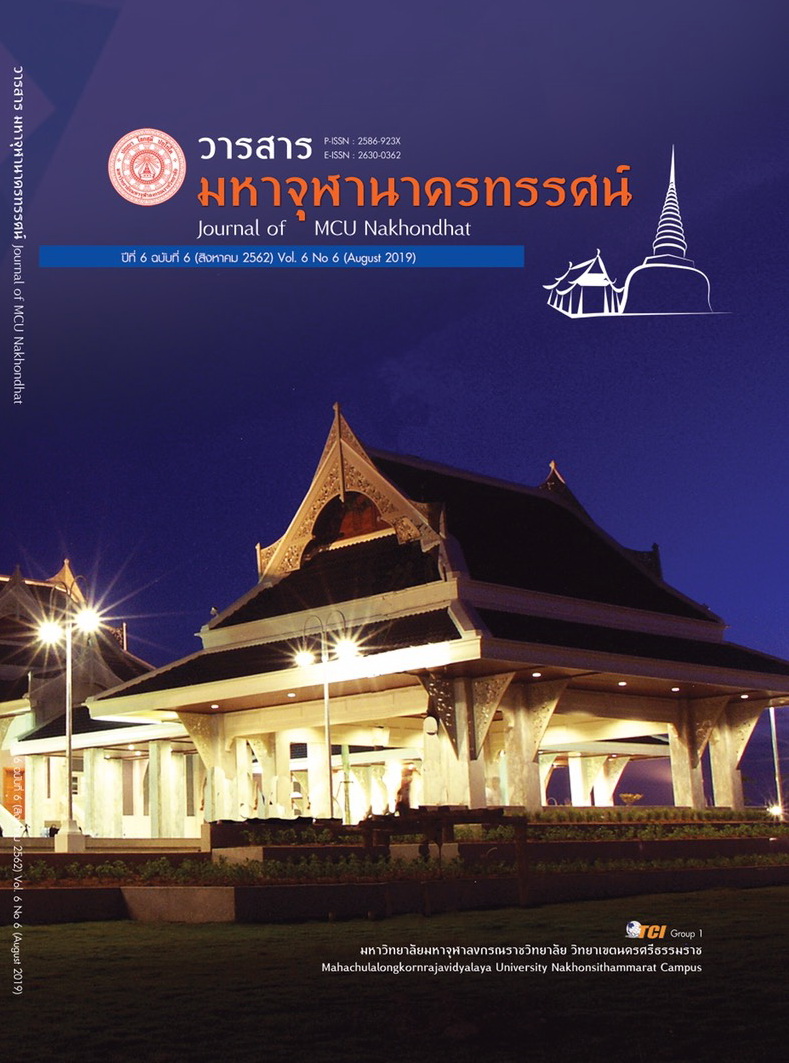THE INTEGRATION OF HERMENEUTICS ON THE PRINCIPLE OF SĂSANAPAṬṬHĂNA AND THE TRUTH OF PAUL RICOEUR’S NARRATIVE
Main Article Content
Abstract
This dissertation entitled ‘The Integration of Hermeneutics on the principle of Săsanapaṭṭhăna and the Truth of Paul Ricoeur’s Narrative’ has objectives: to study the principle of hermeneutics of the Săsanapaṭṭhăna Paul Ricoeur’s concept of hermeneutics in narrative, and propose the integrated model of hermeneutics of the Săsanapaṭṭhăna and Paul Ricoeur’s concept of hermeneutics in narrative. This research is documentary research.
In the study, it was found that: the principle of Săsanapaṭṭhăna was mainly focused on the subjective interpretation leading to objective domain based on the clear-cut system and framework due to its function under the basis of four noble truths. In Paul Ricoeur’s interpretative method, it holds more subjective than objective views and this has been giving rise to both the explanation and understanding resulting in providing the readers the configuration of the narrative as who is the world of the experience of life. In this matter, the interpretation exists between the point of configuration in the text and the re-figuration which is out of the text. when integrated the subjective interpretation method with objective one in Săsanapaṭṭhăna, the consistency and accord in the hermeneutical approach was obtained through the supportive roles of Paul Ricoeur’s flexibility and Săsanapaṭṭhăna’s moral criteria while the textual interpretation was being done.
the Paul Ricoeur’s method obviously holds the strong point in giving the freedom to the readers, on the other hand, the method in Săsanapaṭṭhăna possesses certain criteria in examining as to how is that freedom. In this research, the significant integrated approach of both ways was made so as to provide the concise way of interpretation for any religious languages by which the mutual understanding of intra-inter religion can be achieved in the present world society.
Article Details
References
Lopez, Donald S. Jr. (1988). Buddhist Hermeneutics. Honolulu: University of Hawaii Press.
Ricoeur, Paul. (1981). Hermeneutics and the Human Sciences. Cambridge: Cambridge University Press.
Ricoeur, Paul. (1985). Time and Narrative Volume III. Chicago: University of Chicago press.
Ricoeur, Paul. (1991). Life in Quest of Narrative, in On Paul Ricoeur: Narrative and Interpretation, David Wood. London: Routledge.
Ricoeur, Paul. (2008). From text to Action: Essays in Hermeneutics ll. New York: Continuum.
กีรติ บุญเจือ. (2546). ชุดปรัชญาและศาสนาเซนต์ เล่มห้า ย้อนอ่านปรัชญากังขาของมนุษยชาติ (ช่วงวิจารณ์ระบบเครือข่าย). กรุงเทพมหานคร: สำนักพิมพ์มหาวิทยาลัยเซนต์จอห์น.
ธมฺมปาลเถร. (2539). เนตติอฏฺฐกถา ฉบับมหาจุฬาลงกรณราชวิทยาลัย. กรุงเทพมหานคร: โรงพิมพ์วิญญาณ.
ปกรณ์ สิงห์สุริยา. (2540). ความจริงของเรื่องเล่าทางศาสนา. ใน วิทยานิพนธ์อักษรศาสตร์ดุษฎีบัณฑิต สาขาวิชาปรัชญา. จุฬาลงกรณ์มหาวิทยาลัย.
ปกรณ์ สิงห์สุริยา และคณะ. (2556). เรื่องเล่า อัตลักษณ์ และความยุติธรรมในปรัชญาของปอล ริเกอร์. กรุงเทพมหานคร: โครงการจัดพิมพ์คบไฟ.
ปรุตม์ บุญศรีตัน. (2550). รูปแบบการตีความคัมภีร์ในพระพุทธศาสนาเถรวาท. ใน วิทยานิพนธ์ปริญญาพุทธศาสตรดุษฎีบัญฑิต สาขาวิชาพระพุทธศาสนา. มหาวิทยาลัยมหาจุฬาลงกรณราชวิทยาลัย.
พระเทพเวที (ประยุทธ์ ปยุตฺโต). (2534). มหาวิทยาลัยกับงานวิจัยทางพระพุทธศาสนา. กรุงเทพมหานคร: เนติกุลการพิมพ์.
พระเทพเวที (ประยุทธ์ ปยุตฺโต). (2553). เพื่อความเข้าใจปัญหาโพธิรักษ์. กรุงเทพมหานคร: มูลนิธิพุทธธรรม.
มหากจฺจายนเถร. (2540). เนตฺติ-เปฏโกปเทสปกรณํ ฉบับมหาจุฬาลงกรณราชวิทยาลัย. กรุงเทพมหานคร: โรงพิมพ์มหาจุฬาลงกรณราชวิทยาลัย.
มหาจุฬาลงกรณราชวิทยาลัย. (2539). พระไตรปิฏกภาษาไทย เล่มที่ 28 ฉบับมหาจุฬาลงกรณราชวิทยาลัย. กรุงเทพมหานคร: โรงพิมพ์มหาจุฬาลงกรณ์ราชวิทยาลัย.
ราชบัณฑิตยสถาน. (2532). พจนานุกรมศัพท์ปรัชญาอังกฤษ-ไทย. กรุงเทพมหานคร: ราชบัณฑิตยสถาน.
วีรชาติ นิ่มอนงค์. (2552). การศึกษาวิเคราะห์ทฤษฎีอรรถปริวรรตศาสตร์ในคัมภีร์พระพุทธศาสนา เถวาท. ใน รายงานการวิจัย. มหาวิทยาลัยมหาจุฬาลงกรณราชวิทยาลัย.
สมเด็จพระพุทธโฆษาจารย์ (ป.อ. ปยุตโต). (2559). พุทธธรรม. กรุงเทพมหานคร: สำนักพิมพ์ผลิธัมม์.


